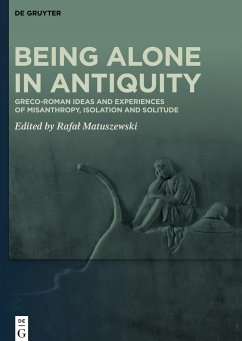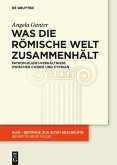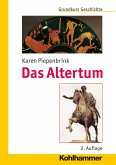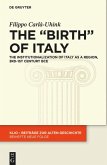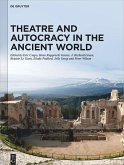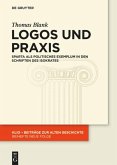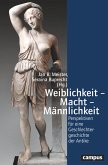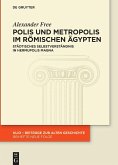This volume aims to provide an interdisciplinary examination of various facets of being alone in Greco-Roman antiquity. Its focus is on solitude, social isolation and misanthropy, and the differing perceptions and experiences of and varying meanings and connotations attributed to them in the ancient world. Individual chapters examine a range of ancient contexts in which problems of solitude, loneliness, isolation and seclusion arose and were discussed, and in doing so shed light on some of humankind's fundamental needs, fears and values.
"Taken as a whole, the volume opens up a new area of study in the classics and is a major and valuable contribution to the study of emotions. [...] In summa: the many facets of loneliness and solitude revealed by this volume demonstrate the subject's great potential in classical scholarship. Hopefully, therefore, it will inspire readers to carry out further study." Justine Diemke in: BMCR 2022.05.06
***
"Angesichts der Covid-Pandemie und ihrer sozialen Folgen seit 2019 werfen die Beiträge auch ein instruktives Licht auf unseren Umgang mit verordneter und selbstgewählter Isolation und social distancing und zeigen die eine oder andere Perspektive zu ihrer Überwindung auf."
Christoph Stenschke in: Theologische Revue 118 (2022)
***
"[...] this wide-ranging collection demonstrates the rich potential of this topic for further research."
Patrick Gray in: Religious Studies Review 49.3 (2023) 392
***
"Der Herausgeber des Bandes, Rafal Matuszewski, zeigt in seiner Einleitung neben einer Besprechung der Begriffsproblematik vor allem die Vielschichtigkeit des Untersuchungsbereiches auf und vermag es, dem Leser sogleich Perspektiven für die eigene Forschung schmackhaft zu machen. [...] Alles in allem gesehen weist der Sammelband eine große Fülle an unterschiedlichen Herangehensweisen verschiedener Disziplinen auf und beleuchtet die Thematik des Alleine Seins deshalb aus vielschichtigen Blickwinkeln. Das ist für den Leser kurzweilig und anregend, gerade auch im Hinblick darauf, welche Potentiale noch in diesem Forschungszweig schlummern."
Theresia Schusser in: Das Historisch-Politische Buch 72/1-2, 90-91
***
"Alles in allem liegt hier ein gut gemischter und anregender Band zu einem interessanten und großen neuen Forschungsfeld vor. [...] Die Stärke des Buches liegt ohnehin in der Vielfalt der Beiträge und behandelten Themen, die dennoch Raum lässt für Vertiefung, Ausweitung und Übertragung auf andere Bereiche der griechisch-römischen Kultur und Literatur - und darüber hinaus."
Martin Stöckinger in: Eos CXI 2024, S. 280-282
***
"Angesichts der Covid-Pandemie und ihrer sozialen Folgen seit 2019 werfen die Beiträge auch ein instruktives Licht auf unseren Umgang mit verordneter und selbstgewählter Isolation und social distancing und zeigen die eine oder andere Perspektive zu ihrer Überwindung auf."
Christoph Stenschke in: Theologische Revue 118 (2022)
***
"[...] this wide-ranging collection demonstrates the rich potential of this topic for further research."
Patrick Gray in: Religious Studies Review 49.3 (2023) 392
***
"Der Herausgeber des Bandes, Rafal Matuszewski, zeigt in seiner Einleitung neben einer Besprechung der Begriffsproblematik vor allem die Vielschichtigkeit des Untersuchungsbereiches auf und vermag es, dem Leser sogleich Perspektiven für die eigene Forschung schmackhaft zu machen. [...] Alles in allem gesehen weist der Sammelband eine große Fülle an unterschiedlichen Herangehensweisen verschiedener Disziplinen auf und beleuchtet die Thematik des Alleine Seins deshalb aus vielschichtigen Blickwinkeln. Das ist für den Leser kurzweilig und anregend, gerade auch im Hinblick darauf, welche Potentiale noch in diesem Forschungszweig schlummern."
Theresia Schusser in: Das Historisch-Politische Buch 72/1-2, 90-91
***
"Alles in allem liegt hier ein gut gemischter und anregender Band zu einem interessanten und großen neuen Forschungsfeld vor. [...] Die Stärke des Buches liegt ohnehin in der Vielfalt der Beiträge und behandelten Themen, die dennoch Raum lässt für Vertiefung, Ausweitung und Übertragung auf andere Bereiche der griechisch-römischen Kultur und Literatur - und darüber hinaus."
Martin Stöckinger in: Eos CXI 2024, S. 280-282

